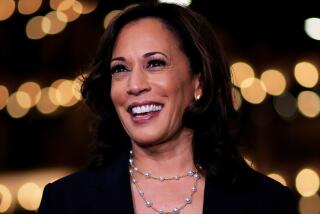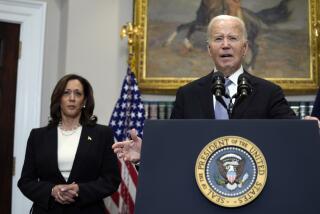Trump decides not to run for president
WASHINGTON — The end of Donald Trump’s short-lived presidential flirtation Monday further whittled the still-evolving Republican field and marked what many in the party hoped was a stepped-up focus on serious contenders for the nomination.
The possibility of a 2012 White House bid by the outspoken real estate magnate dominated the political environment for much of April as Trump insisted he was considering a run. But his relentless questioning of President Obama’s birthplace led many on both sides of the aisle to criticize his potential candidacy as a sideshow. His focus appeared particularly frivolous after the killing of Osama bin Laden in early May.
After topping GOP polls in early April, Trump had fallen dramatically in many surveys by the end of the month.
For all of the hoopla around Trump’s will-he-or-won’t-he candidacy, many Republican operatives viewed former Arkansas Gov. Mike Huckabee’s announcement Saturday that he will not run as the bigger political development in recent days.
The decision by Huckabee, a former Baptist minister who won the 2008 Iowa caucuses, underscored the absence of a top-tier contender with a lock on the religious voters who dominate Iowa and South Carolina, two of the four earliest nominating contests.
Calling Huckabee’s decision to stay out a “momentous” development, Iowa Republican Gov. Terry Branstad on Monday predicted one of the most wide-open races in the history of the state and urged candidates to step up their activities there.
As for Trump, his decision “has no impact whatsoever on the Republican race because he never was a serious candidate to begin with,” said Republican pollster Whit Ayres, who is advising the former ambassador to China, Jon Huntsman, as he contemplates a bid. “He was a reality show star who was trying to boost his ratings.”
Even as he bowed out, Trump retained his trademark braggadocio, insisting that he could have won the White House.
“Ultimately, however, business is my greatest passion and I am not ready to leave the private sector,” he wrote in a long statement in which he promised to “continue to voice my opinions loudly.”
He broke the news during a brief appearance at NBC’s annual programming presentation to advertisers in New York, saying he would continue on the popular reality show “Celebrity Apprentice.” “I will not be running for president, as much as I’d like to,” Trump said, prompting a robust cheer.
By some measures, Trump had one of the fastest rises and falls in presidential politics. Some opinion polls in early April showed him as the preferred candidate of Republican voters.
But his demand for proof that Obama was born in Hawaii was silenced when the White House produced the president’s original long-form birth certificate. At the end of last month, he raised eyebrows with a profanity-laced speech in Las Vegas in which he declared, “Our leaders are stupid.”
A May 4 Quinnipiac University national poll showed that 58% of American voters said they would never vote for the business baron.
“A candidate with disapproval ratings in the stratosphere like Mr. Trump probably made the right decision not to give up his day job,” said Peter Brown, assistant director of the Quinnipiac University Polling Institute.
Trump’s announcement -- coming at least at week before he originally said he would relay the news -- triggered a sigh of relief among many Republican strategists who hoped it meant the primary contest was finally moving into gear.
“Trump’s departure is a sign that the race is getting serious and reasonably well-defined,” said Vin Weber, a former GOP House member who is an advisor to former Minnesota Gov. Tim Pawlenty’s presidential campaign.
The slow start by the potential challengers to Obama has created a sense of uncertainty in the primary battle. So far, the only major contenders to file candidacy papers are Pawlenty, former House Speaker Newt Gingrich and former Massachusetts Gov. Mitt Romney -- and Romney has not yet officially announced his candidacy.
Huntsman, Minnesota Rep. Michele Bachmann and Indiana Gov. Mitch Daniels have said they will decide in the coming months whether to run. Former Alaska Gov. Sarah Palin’s intentions are unclear.
“The fact is that I don’t think there’s a front-runner in the real political sense; there are front-runners in name ID sense,” said longtime GOP strategist Ken Khachigian. “I’d say it’s very fluid.”
tom.hamburger@latimes.com
More to Read
Get the L.A. Times Politics newsletter
Deeply reported insights into legislation, politics and policy from Sacramento, Washington and beyond. In your inbox three times per week.
You may occasionally receive promotional content from the Los Angeles Times.










